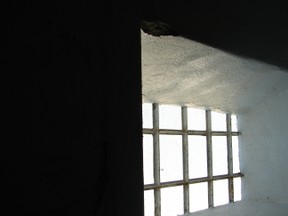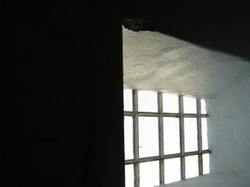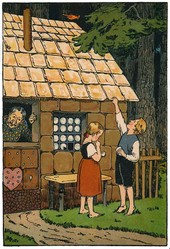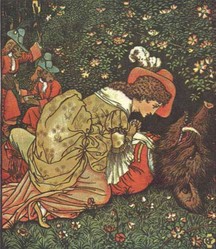
The Lockless Door: Analysis
by KarenTBTEN
Robert Frost's The Lockless Door is an enigmatic poem, but an evocative one. On this page, I share my analysis of a favorite poem.
Interpretation of the Lockless Door
Tackling an Enigmatic Poem
 Robert Frost's "The Lockless Door" begins with an evocative line, "It went many years, but at last came a knock." The opening can be interpreted in multiple ways. Does the first phrase mean -- as students sometimes suggest -- that the speaker has received no visitors for years?
Robert Frost's "The Lockless Door" begins with an evocative line, "It went many years, but at last came a knock." The opening can be interpreted in multiple ways. Does the first phrase mean -- as students sometimes suggest -- that the speaker has received no visitors for years?
This is doubtful. Doors are often used in a metaphorical sense, both in poetry and in casual conversation. We may shut doors on love, friendship, or opportunity. The speaker has shut the door on something, but not necessarily on everyone. If we understand the door to be metaphorical, we can consider the possibility that the poem's persona has shut the door not on the masses, but on one particular person.
knock is something the speaker has waited for. It's a phrase one typically chooses for an anticipated event, not a dreaded one. When a knock does finally come, the speaker raises both his hands in supplication to the door. This could suggest some pull, or draw. The poem's persona could have chosen to pray to a higher power, but no, it's to the door that he directs his attention. One might imagine him hopeful, but afraid to know the truth.
 At one point, the speaker climbs out onto the sill. When he climbs back into the room, he bids whatever was at the door to come inside. The use of the word "whatever" (as opposed to "whoever") doesn't necessarily mean that he is making the force outside the door more ominous than a mere person would be. Even if the speaker knows who the person is, he doesn't know what the knock means. Has the person come to apologize, to declare love... or to deliver less welcome tidings? The word whatever could suggest the speaker's uncertainty about which of these possibilities is the truth.
At one point, the speaker climbs out onto the sill. When he climbs back into the room, he bids whatever was at the door to come inside. The use of the word "whatever" (as opposed to "whoever") doesn't necessarily mean that he is making the force outside the door more ominous than a mere person would be. Even if the speaker knows who the person is, he doesn't know what the knock means. Has the person come to apologize, to declare love... or to deliver less welcome tidings? The word whatever could suggest the speaker's uncertainty about which of these possibilities is the truth.
Then there is the closing stanza, which is sometimes taken as an acknowledgement on the part of the speaker of the irony of his actions :"I emptied my cage, to hide in the world and alter with age." Is it so nonsensical to hide in the woods from something as innocuous as a knock -- when the larger world holds so much real danger? Not necessarily. There is one situation where it does indeed make sense to hide at large in the world: when a person is hiding not from people in general but from one. And when we shut the door on a chance, or a love, we are often acutely aware of the passing of years, and the ways the years alter us.
Poem: The Lockless Door
Video: The Lockless Door
Visual Interpretation, with Lyrics
More Robert Frost Resources
Teaching Frost's Poetry
Discussion of Robert Frost poetry with discussion questions and links to other resources.
About this Analysis
"The Lockless Door" is indeed evocative for me. When I first read those openning lines, I had a sense of who was at that door... in the context of my life at least. I was aware of having hidden in the world -- in a metaphorical sense -- and I didn't feel foolish for it; however welcome the knock, it was more frightening than the bears (or the strangers) outside. I checked individual lines against my overall interpretation of the poem, struggling a bit with the image of the narrator turning out the light and making an attempt at escape. Ah, but the escape was momentary -- a moment later came the bid to come in. A moment later comes, perhaps, the needed courage.
Is this what the poem is really about? It's not possible to know. I did do some research and read a few more interpretations. They varied a good deal, and some rang more true for me than others.
There can of course be a danger in relying entirely on a personal interpretation of a poem. It can be a good thing to also consider the life of the poet and the context of the poem. Often, though, the search fails to produce a definitive answer. If a person starts with a gut feeling -- a personal meaning -- they're less likely to end up with an overly literal interpretation or one that doesn't ring true in the context of the poet's character. I keep coming back to the tone of the poem. I don't get a sense that Frost is being ironic -- or writing about some character that he doesn't understand.
About this Poem
Robert Frost's poem, The Lockless Door, was published in 1920 and is in the public domain. (Feel free to reprint it, record it, set it to music, and otherwise interpret it!)
More Interpretations of The Lockless Door
Thoughts on The Lockless Door
This writer sets the stage, using his own imagery to recreate a frightened narrator. He believes the narrator does strongly want to avoid the alteration the knock will bring -- this is a very different read of those last lines.
Study Guide
This author explains the poem in the context of an event in Robert Frost's life and an excessive fear of the dark.
You might also like
10 Themes in Hansel and GretelHow Hansel and Gretel earned their special place among so many fairy tales? C...
The Beauty and the BeastBeauty and the Beast has many versions, interesting interpretations and has b...



 Teaching Critical Literacy with Classic Children's Literatureon 09/25/2011
Teaching Critical Literacy with Classic Children's Literatureon 09/25/2011
 Creating a Realistic Dollhouse Exterioron 09/12/2011
Creating a Realistic Dollhouse Exterioron 09/12/2011
 KarenTBTEN: a Life Onlineon 09/05/2011
KarenTBTEN: a Life Onlineon 09/05/2011
 Flower Poems Personifiedon 09/04/2011
Flower Poems Personifiedon 09/04/2011


Comments or Interpretations
Yes it does use the word " whoever" and I believe he is being ambiguous about this person because has fear. He has fear of people.
the real poem does indeed use the word whoever, not whatever
Although I love Robert Frost's work, I was not familiar with this poem. Thanks for introducing me to it.
Great analysis of the poem.